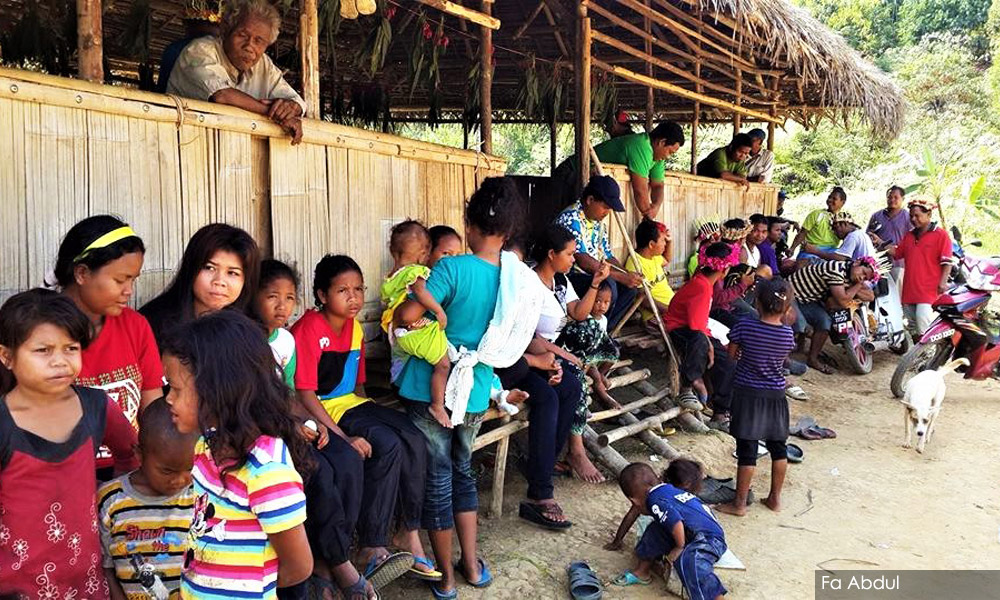Environmental NGO Sahabat Alam Malaysia (SAM) has demanded an immediate halt to iron ore mining operations, feared to be causing heavy metal contamination in rivers and posing a health risk to a Temiar community downstream from their operation in Bukit Tambun, Gua Musang, Kelantan.
This follows claims by Kampung Kelaik villagers that the rivers had turned a rusty red since mining began over a decade ago, and a recent blood test conducted by Malaysiakini revealed high chromium levels in one of six villagers who volunteered for testing.
“The Health Ministry, the Environment Department and the state government must take urgent action.
“They need to stop the operations of the companies carrying out the iron ore mining immediately and conduct further investigations.
“They also need to provide alternative water supply to the community, since water from the rivers should not be relied on for their basic needs,” SAM president Meenakshi Raman (above) said in a statement yesterday.
A chemical health expert who reviewed the result of the blood tests and water sample test earlier told Malaysiakini there is a likely link to the mining due to the relatively high level of chromium at one mine discharge point.

When asked about other potential sources of contamination, chemical health assessor Vivien How said pesticides used in large-scale plantations in the vicinity of the village could “seep into the soil, contaminate the water, and further enhance environmental burdens”.
Malaysiakini's testing also found that the sample from a pond where tailing sediments were dumped found elevated levels of both chromium-6 (19.4mg/L) and chromium-3 (34.8mg/L).
The permissible levels for both chromium variants are 1.4mg/L and 2.5mg/L respectively for Class III water sources, according to the Department of Environment. Class III refers to rivers that can support aquatic and some human activities with proper treatmen
Cancer risk
The Malaysiakini investigation found a 19-year-old Azlan Ahak from Kampung Kelaik whose blood tests showed abnormally high Chromium levels, with an estimated lifetime carcinogenic risk (LCR) that far exceeded the normal threshold.
Chemical health assessor How estimates Azlan’s lifetime risk of developing cancer is 64,000 times higher than normal.
How stressed that the findings are red flags, warranting immediate investigation by relevant authorities due to their severe health implications.
Azlan's test results are significant as chromium stays in the body for weeks, if not months, indicating that his exposure was recent, likely occurring just before the test was conducted last month.
Meenakshi expressed shock over the findings and urged the authorities to prioritise the health and safety of the Temiar community, emphasising the need to identify and address the root cause of the poisoning before allowing mining operations to resume.
“Excuses that the companies are operating within the limits of the law cannot be accepted since the community is already suffering severe ill health which must not be condoned any further,” she said.
Operator says it complies with regulations
Malaysiakini contacted both mine operators, Redstar Capital Sdn Bhd and Aqua Orion Sdn Bhd.
The larger of the two mines, Redstar Capital's administration manager, Julice Chu Lai Siong defended the company’s practices adding that media coverage of the issue over the past 10 years had been one-sided.
She said the mine uses a “closed circuit” and “zero discharge” concept where the effluent is recycled into the mine processing, ensuring no effluent wastewater is released into the river.
However, when Malaysiakini visited the mining site, it saw two points where water came out of mining ponds into a stream.
Chu said although Redstar Capital doesn't discharge waste into the river, it still ensures its effluents don't exceed the Minerals and Geoscience Department's set limits of 0.20mg/L for chromium-6 and 0.05mg/L for chromium-3.
She added that Redstar Capital also sends water samples from the rivers near the mine to the JMG and DOE monthly.
She said Redstar Capital has never received complaints from the community about its operations.
The other mine operator, the DOE, the Minerals and Geoscience Department, and the Orang Asli Development Department have yet to respond to Malaysiakini.
Health Minister Dzulkefly Ahmad said he would instruct this ministry to check the villagers for heavy metals poisoning. - Mkini




No comments:
Post a Comment
Note: Only a member of this blog may post a comment.